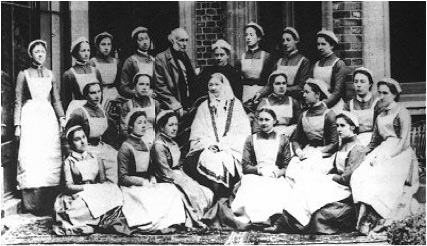Unit 1. The beginnings of modern nursing
Florence Nightingale or “Lady of the Lamp”

She is considered as the Matriarch of Modern Nursing. She was born in in Florence, Italy on May 12, 1820 and she was the daughter of a wealthy landowner, William Nightingale. Her father took responsibility for her education and taught her Greek, Latin, French, German, Italian, History, Philosophy and Mathematics.
At the age of 25, she wanted to become a nurse, but her parents totally opposed to the idea because they viewed nursing as associated with the working class women. She was already 31 when her father gave her the permission to train as a nurse.
She began her nursing training in 1851 in Germany. Her experience in treating sick/injured soldiers in the Crimean War strongly influenced her philosophy of nursing. To achieve her mission of providing nursing care, she needed to address the environmental problems (overcrowding, poor ventilation, rats and insects crawling, lack of basic supplies such as coats, mattresses, washbasins, soaps, towels, water available in inadequate amount and others.) Her views were rejected due to the prejudices regarding women’s involvement in medicine.
She received little support from the military so she used her contacts at TheTimes newspaper to report the way that the British Army treated its wounded soldiers. After a great deal of publicity, she was then given the task of organizing the barrack’s hospital, she then began the improvements in the quality of sanitation wherein she was able to reduced the death rate of her patients.
To communicate her opinions on reform she published Notes on Hospital and Notes on Nursing (1859)
She is considered nowadays as the first nursing theorist. Her writings were mainly a guide to help organize & manipulate the environment for persons requiring nursing care. She pioneered the formal concept of nursing education.
With the support of wealthy friends Nightingale was able to raise enough funds to improve the quality of nursing. In 1860, she used this money to establish the Nightingale School of Nursing and Home for Nurses at St. Thomas’ Hospital. She died on 13th day of August 1910 in London.
Florence’s main views on Nursing
She believed that people are in relation with the environment and she stressed the healing properties of the physical environment (fresh air, light, warmth, and cleanliness)
“Nature alone cures´” was one of her mottos.
The health of the home/community are critical components in an individual’s health.
Nurses help patients retain their own vitality by meeting their basic needs through control of the environment
Nursing is a discipline distinct from medicine focusing on the patient’s reparative process rather than on their disease!!
Nursing Education
By establishing the St. Thomas Hospital and King’s College Hospital in London, she was able to provide a framework for the establishment of nursing training schools through a universal template that contains principles of nursing training. These principles included instruction in scientific principles and practical experience for the mastery of skills.
She also advocated the separation of nursing training from the hospital to a more appropriate learning environment in the school or university setting. This was advocated because she believed that nursing student’s role is to learn the art and science of nursing before being employed in the nursing service.
Her School for Nurses

Some Bibliography
- Baly, Monica E. 1997 (2nd edition). Florence Nightingale and the Nursing Legacy. London : Whurr.
- Dossey, B. 2010. Florence Nightingale: Mystic, Visionary, Healer. Philadelphia: F.A. Davis.
- Gill, G. 2005. The extraordinary upbringing and curious life of Miss Florence Nightingale. New York: Random House.
- Nightingale , F. 1860. Notes on Nursing: What it is, and What it is not. New York: Appleton and Company.
- Florence Nightingale Museum.